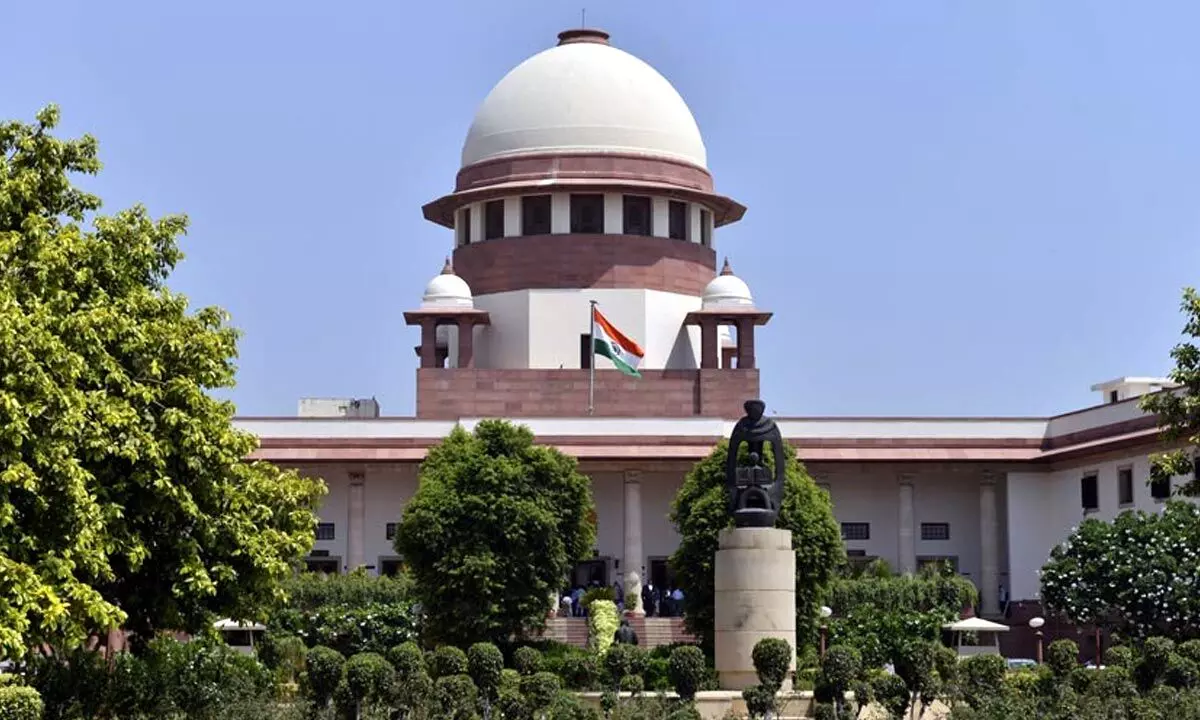Live
- SCR cancels Sabarimala special trains citing low occupancy
- Vizianagaram: Youth fly drones to highlight bad road
- Vijayawada: Inter-district offender nabbed, Rs 26 lakh loot seized
- Congress cancels all programmes for 7 days in honour of Dr. Manmohan Singh
- Nara Lokesh Pays Tribute to Manmohan Singh, says he is a visionary leader
- 6th World Telugu Writers meet from Dec 28
- Sri City role in strengthening Atmanirbhar Bharat lauded
- PCC chief accuses PM of lying on Visakha steel
- Vaikunta Dwara Darshan: Only those with tokens, tickets to be allowed
- Bandi Sanjay visits aspirational block in Narayanpet
Just In
'Executives must be given opportunity to put up case': Supreme Court on verdict refusing 'guilty by association' doctrine

Supreme Court of India
The Supreme Court on Thursday reserved its judgment on Centre's plea to review the two judgments of 2011, in which a provision of the Terrorist and Disruptive Activities (Prevention) Act
New Delhi: The Supreme Court on Thursday reserved its judgment on Centre's plea to review the two judgments of 2011, in which a provision of the Terrorist and Disruptive Activities (Prevention) Act (TADA) (now repealed) was read down to hold that mere membership of a banned organisation cannot incriminate a person unless the person resorted to or incited violence.
During the hearing, a bench headed by Justice M.R. Shah observed that Central government executives are required to be given an opportunity to put forward their case, and that is also Parliament wanted to say, which is missing here.
The bench, also comprising Justices C.T. Ravikumar and Sanjay Karol, said that this court has not held that Union of India executives are not required to be heard at all. The apex court judgments had come while hearing two separate cases of bail and conviction under the TADA.
On Wednesday, the bench had queried: "Before reading down a provision, wasn't the other bench required to hear the Union of India? How can you read down a central statute without giving them an opportunity?"
The Centre had argued that the two-judges should have sought its views at the time of hearing these cases but the reading down of the TADA provision had also impacted a similar provision under the Unlawful Activities (Prevention) Act (UAPA), which prescribes punishment for being a member of an unlawful association.
Solicitor General Tushar Mehta, representing the Centre, had submitted that if Lashkar-e-Taiba is a banned organisation, then a person cannot say he is merely a member and has a right to remain a member.
He argued that the right to form an association cannot be an unbridled right, and when it affects sovereignty and integrity of the country, then restrictions will be reasonable. He further argued that 2011 judgments did not consider a bundle of significant considerations -- legislative intent and also Parliament has engrafted certain provisions to keep the security of the nation intact.
Senior advocate Sanjay Parikh, appearing for an intervenor, defended the 2011 judgments, emphasising that since the 1960s, a series of judgments by the apex court have held that there must be an overt act of incitement or violence before a person can be prosecuted.
The top court noted that 2011 judgments came during hearings on criminal cases, where no party had questioned the legal validity of the TADA provision or the doctrine of "guilty by association".
It queried that if has to consider the jurisdiction under which it is hearing a case, and if a bail matter is before it, how can it go into the constitutional validity of a provision without a challenge to that law?
"Can it be said that merely because we are the Supreme Court, we can go into the validity of anything in any manner?" it noted.
The apex court was hearing a reference made in 2014 by the two-judge bench of the apex court in view of the judgments in the matters of Arup Bhuyan and Indra Das. While making the reference, the top court was informed by the Centre that in Arup Bhuyan, the court has read down the TADA provision to the detriment of the interest of the Union of India when it was not a party before it, and moreover, and also when the constitutional validity was not in question.

© 2024 Hyderabad Media House Limited/The Hans India. All rights reserved. Powered by hocalwire.com






